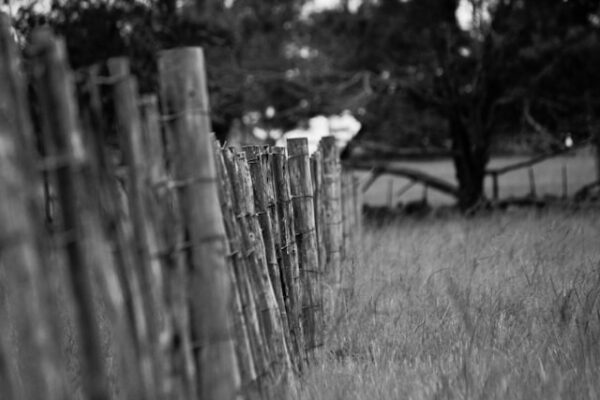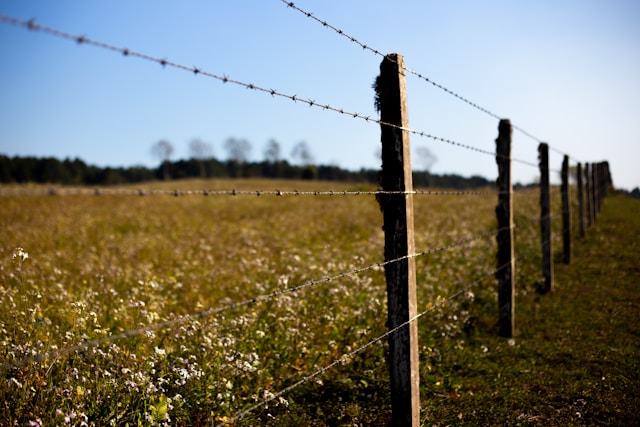The role of farm fences in ensuring the safety, efficiency, and sustainability of agriculture is highly important and cannot be over-emphasized. With the development of new IoT in agriculture, and changing methods of farming, the ability to choose the right farm fence is a strategic decision that can have a big impact on the success of the farm. Strong, adaptable fencing solutions are essential to help farmers meet the demands of modern agriculture.
The agricultural industry is currently changing with innovations such as sustainable agriculture, sustainable practices, and the integration of smart technologies. These advances are changing the way farms are run, as the need for reliable and effective farm fencing is more important than ever.This new transition towards the use of technology on our farms means that agricultural fences should not only be durable, but also adaptable to a variety of uses, from livestock fencing to protecting valuable crops.
Sustainability is another important factor influencing the design and selection of agricultural fences. As more and more farmers use environmentally friendly methods, there is a growing demand for fences made from natural materials that are sustainable and have a reduced impact on the environment.
Proper agricultural fencing can help farmers achieve these goals by using durable and environmentally friendly materials.
The Importance of Choosing the Right Farm Fence
Choosing the right farm fence is critical to the smooth running of your farm. Proper fencing can increase security, protect livestock and crops, and improve overall farm management. The agricultural sector faces many challenges in 2024, from rising prices to increased theft and wildlife attacks, so the importance of choosing agricultural fences cannot be overstated.
Farm fences are the first line of defense against outside threats. They protect livestock from predators, protect crops from wildlife, and prevent unauthorized access to your property. For example, high wire fences are better for strength and flexibility, and are ideal for larger animals such as cattle. The type of farm fence you have can also affect your daily farming activities. A fence that is easy to install and maintain can save a lot of time and money on labor—an important consideration given the ever-increasing costs of farming.
Best 10 Farm Fences in 2024
Choosing a suitable farm fence is an important choice for farmers in the year 2024. The decision to install a farm fence does not only establish the limits of your land, but additionally safeguards your livestock, vegetation, and equipment in opposition to external risks such as predators, theft, and severe weather situations. When confronted with a wide variety of choices, it is vital to recognize the awesome advantages and downsides of every category so that you can make a well-knowledgeable preference. In this newsletter, we study the pinnacle 10 agricultural fences of 2024, such as detailed analysis in their premier programs, benefits, and downsides.
The High Tensile Wire Fence
The High-Tensile Wire Fence is a fencing option that offers each energy and versatility.
High-tensile cord fencing is a broadly desired choice for modern farms, especially those who house sizeable cattle like farm animals. This precise shape of fence is renowned for its top notch durability and adaptableness, making it ideal for enclosing huge areas with minimum maintenance.
Advantages:
Durability: High-tensile twine has tremendous strength and is incredibly immune to put on, subsequently minimizing the need for ordinary upkeep.
Economical: Despite its sturdiness, it’s far pretty inexpensive in comparison to opportunity fencing picks.
Minimal Upkeep: After set up, it necessitates little maintenance, ensuing in time and aid savings.
Drawbacks:
Installation: The technique of putting in high-tensile cord fencing may be bodily annoying, because it calls for precise equipment and a excessive degree of knowledge and skill.
Visibility: The slender wires may also pose a undertaking for both animals and those in phrases of belief, perhaps main to accidents if now not accurately indicated.
Electric Fence: Advanced Security Solutions
Electric fencing is a modern solution that provides both a physical and psychological barrier. It’s commonly used for livestock management, as the mild electric shock deters animals from crossing the boundary.
Advantages
- High Security: Effectively deters animals and potential intruders.
- Flexible Design: Can be adapted to various layouts and terrains.
- Low Cost: Generally cheaper to install than traditional fencing, especially over large areas.
Drawbacks
- Power Dependency: Requires a consistent power source, which may be unreliable in remote areas.
- Maintenance: Regular checks are necessary to ensure the system is functioning correctly, especially after storms or power outages.
Best Use: Suitable for all types of livestock and properties where enhanced security is needed, particularly in areas prone to wildlife intrusion.
Barbed Wire Fence: Classic and Cost-Effective
Barbed wire fencing is a time-tested option, widely recognized for its affordability and effectiveness in containing livestock and deterring intruders. It remains a staple on many farms due to its simplicity and reliability.
Advantages
- Affordability: One of the most cost-effective fencing options available.
- Ease of Installation: Can be installed relatively quickly, even over large areas.
- Deterrence: The barbs provide a physical deterrent, discouraging animals and people from crossing.
Drawbacks
- Injury Risk: The barbs can cause injury to both animals and humans, making it less suitable for areas with high traffic.
- Maintenance: Requires regular inspections to ensure the wire remains taut and intact.
Best Use: Best for large, rural properties where cost is a significant factor, and where the risk of injury from the barbs is minimal.
Calculate the Dimensions of Your Farm Fence
Woven Wire Fence: Versatility and Reliability
Woven wire fencing is known for its versatility, making it an excellent choice for farms with diverse livestock needs. This type of fence consists of horizontal and vertical wires woven together, creating a strong mesh that can contain a variety of animals.
Advantages
- Versatility: Suitable for different types of livestock, including sheep, goats, and pigs.
- Strength: The woven structure provides excellent strength and durability.
- Safety: The absence of sharp edges reduces the risk of injury to animals.
Drawbacks
- Cost: More expensive than barbed wire or high-tensile wire fences.
- Installation: Can be labor-intensive to install, particularly in hilly or uneven terrain.
Best Use: Ideal for farms with mixed livestock that require a versatile and secure fencing solution.
Vinyl Fence: Low Maintenance and Aesthetic Appeal
Vinyl fencing offers a blend of durability, low maintenance, and aesthetic appeal, making it a popular choice for farms that prioritize both function and appearance. This type of fencing is particularly favored for its resistance to weathering and its clean, modern look.
Advantages
- Low Maintenance: Vinyl does not rot, rust, or require painting, making it very low maintenance.
- Durability: Resistant to UV rays, pests, and moisture, ensuring a long lifespan.
- Aesthetic Appeal: Offers a neat and professional appearance that can enhance the farm’s visual appeal.
Drawbacks
- Cost: Higher upfront cost compared to other fencing materials.
- Limited Strength: Not as strong as metal options, making it less suitable for containing large or aggressive animals.
Best Use: Best for areas of the farm that are highly visible or for properties where aesthetics are a priority, such as equestrian facilities.
Wooden Rail Fence: Traditional and Sturdy
Wooden rail fencing is a classic choice that combines traditional aesthetics with solid functionality. It’s particularly popular on horse farms due to its sturdy construction and attractive appearance.

Advantages
- Aesthetic Appeal: Offers a rustic, traditional look that blends well with natural surroundings.
- Strength: Strong enough to contain large animals like horses and cattle.
- Versatility: Can be customized in terms of height and spacing between rails.
Drawbacks
- Maintenance: Requires regular maintenance, such as painting or staining, to prevent rot and damage from weathering.
- Cost: Can be expensive to install and maintain, especially over large areas.
Best Use: Ideal for horse farms and properties where traditional aesthetics are important and where robust containment is needed.
Chain Link Fence: Affordable and Durable
Chain link fencing is a practical option that offers durability at an affordable price. It’s widely used for securing farm boundaries and protecting areas that require a sturdy, no-nonsense barrier.
Advantages
- Affordability: Relatively inexpensive compared to other durable fencing options.
- Durability: Resistant to rust and corrosion, particularly when galvanized.
- Visibility: The open weave provides visibility, allowing for easy monitoring of enclosed areas.
Drawbacks
- Appearance: Lacks the aesthetic appeal of wood or vinyl fencing.
- Limited Security: While durable, it may not provide the same level of security as electric or barbed wire fences.
Best Use: Suitable for perimeter fencing around farmyards or for securing areas where visibility is important, such as around barns or storage areas.
Mesh Fence: Perfect for Poultry and Small Livestock
Mesh fencing is specifically designed to contain smaller animals, such as poultry, sheep, or goats. The tightly woven mesh prevents animals from escaping while also keeping predators out.
Advantages
- Security: Provides a secure barrier for small animals, preventing escape and protecting against predators.
- Versatility: Available in various mesh sizes to suit different types of livestock.
- Durability: Typically made from galvanized steel, offering resistance to rust and corrosion.
Drawbacks
- Cost: Can be more expensive than simpler fencing options like barbed wire.
- Installation: Installation can be labor-intensive, particularly when covering large areas.
Best Use: Ideal for containing small livestock or poultry and for protecting gardens or other areas that need to be safeguarded from small animals.
Field Fence: Ideal for Large Areas
Field fencing is a popular choice for large-scale farms that require a reliable, cost-effective solution for containing livestock over extensive areas. It is constructed from heavy-gauge wire with large openings, making it suitable for various types of animals.
Advantages
- Coverage: Efficiently covers large areas, making it ideal for extensive farms.
- Strength: Sturdy construction capable of containing larger animals.
- Cost-Effective: Offers a good balance between cost and durability for large-scale applications.
Drawbacks
- Installation: Can be challenging to install on uneven terrain.
- Maintenance: May require regular tension adjustments to maintain effectiveness.
Best Use: Best suited for large pastures and fields where livestock needs to be contained over vast areas, particularly for cattle or sheep.
Temporary/Portable Fence: Flexibility for Changing Needs
Temporary or portable fencing provides the flexibility that permanent structures cannot. These fences are easy to set up, move, and remove, making them ideal for rotational grazing, temporary boundaries, or event management on farms.
Advantages
- Flexibility: Can be easily moved and reconfigured to suit changing needs.
- Cost-Effective: Lower initial investment compared to permanent fences.
- Ease of Installation: Quick to set up and take down, requiring minimal tools and labor.
Drawbacks
- Durability: Not as durable as permanent fencing solutions, making them less suitable for long-term use.
- Security: Provides less security than more robust, permanent fencing options.
Best Use: Ideal for temporary or rotational grazing, managing seasonal livestock, or for use in areas where permanent fencing isn’t practical.
FAQs on Farm Fences
What is the most durable agriculture fence available in 2024?
The most durable agriculture fence in 2024 is the high-tensile wire fence. Known for its strength and flexibility, it can withstand extreme weather conditions and heavy livestock pressure, making it a top choice for long-term farm security.
How can I reduce the cost of fencing on my farm?
To reduce fencing costs, consider using barbed wire or field fences, which are cost-effective for covering large areas. Additionally, focus on proper installation to minimize maintenance expenses and explore bulk purchasing or recycled materials to further lower costs.
Which agriculture fence is best for mixed livestock?
Woven wire fences are highly versatile and are the best choice for farms with mixed livestock, such as sheep, goats, and pigs. They provide a secure barrier for different animal sizes while preventing escape and protecting against predators.
What type of fence is ideal for crop protection?
For crop protection, mesh fences are ideal as they keep small animals and pests out, preventing crop damage. They are especially effective in protecting gardens and fields from wildlife intrusion.
How often should I maintain my farm fence?
Farm fences should be inspected regularly—at least once per season—to check for wear and tear. Maintenance may include tightening wires, repairing any damage, and treating materials like wood to prevent rot and weathering.
Are there eco-friendly fencing options available in 2024?
Yes, eco-friendly fencing options include vinyl fences, which are made from recyclable materials, and wooden rail fences sourced from sustainably managed forests. These options not only reduce environmental impact but also offer durability and aesthetic appeal.

